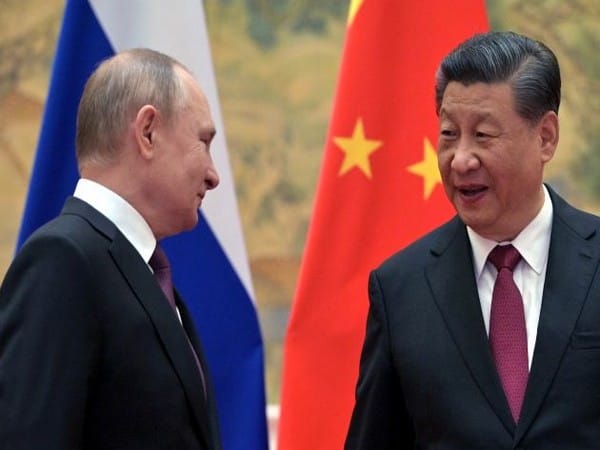Moscow [Russia], October 15 (ANI): Russia and China are coming closer to weathering strategic and economic threats from isolation and war, in the face of opposition from the West.
The West under the leadership of the US has isolated both countries and put in place containment policies to scuttle their journey to become a geo-political power, reported Geo-politik.
Their bonhomie was apparent in forums like Shanghai Cooperation Organization (SCO) as well as bilateral economic give and take. The political trust, strategic coordination and pragmatic cooperation between the two countries further reached an unprecedented level during the 2022 Winter Olympics, with their joint declaration to proclaim “their cooperation with no limit”.
Moreover, China appears to be standing firm in its support of Russian President Vladimir Putin both indirectly on the battlefield and directly through economic cooperation. China has stated its “no limit friendship” with Putin. Beijing sees Russia as an important partner in muscling international institutions away from Washington’s sphere of dominance.
Recently, the Beijing-based newspaper Huangqiu Shibao wrote that Russia and China continue to deepen cooperation to safeguard their fundamental strategic interests, reported Geo-politik.
China’s recent official statements indicate a desire to strengthen ties with Russia, not curtail them. On the sidelines (September 22) of the UN General Assembly meeting in New York, Chinese Foreign Minister Wang Yi told his Ukrainian counterpart that Beijing will continue to play a constructive role in promoting peace and will not take advantage of the Ukraine crisis for its own ends.
Meanwhile, in a meeting with EU foreign affairs Chief Josep Borrell, Wang informed that China would “play its role in its own way” in the Ukraine conflict, reported Geo-politik.
Earlier, during the SCO summit (September 15-16) in Uzbekistan, Chinese President Xi Jinping made no mention of Ukraine in his remarks.
While Putin acknowledged China’s “questions and concerns” about the war, he noted that “the world is changing fast but one thing stays the same: the friendship between China and Russia”, describing the relationship as a “full-scale strategic partnership”.
Similarly, a senior Chinese diplomat Yang Jiechi told (September 12) the Russian ambassador to China Andrey Denisov that Xi and Putin could work together to “promote the development of the international order in a more just and rational direction”.
In terms of the trade too, China has ramped up its purchases of oil from Russia in recent months, with Russia becoming China’s top oil provider for three months in a row this year from May to July, helping to offset Moscow’s losses, reported Geo-politik.
The Ukraine war is hurting Russia and strategically isolating it including wide economic sanctions, which many observers view was weakening Moscow.
China, on the other hand, is finding it difficult to continue its uninterrupted rise to become a global power amid the strong backlash by the United States and its Asian-European allies on the count of its autocracy and violations of human rights and international laws.
It is the economic sanctions and the Ukraine war, according to many analysts, that have given ground to both Russia and China to come closer to weathering strategic and economic threats from isolation and war, reported Geo-politik.
China’s dilemma, however, is that it cannot take this bonhomie beyond a limit because its journey to become a global power crucially depends on its engagements with the West and its endorsement.
Since both China and Russia are being isolated by the West as claimants of global power, they have a reason for strategic engagements. Beijing’s goal is surely to preserve its entente with Russia at the strategic level to counterbalance American power and weather economic pressure from the West, reported Geo-politik.
However, Beijing would likely tread cautiously with its bonhomie with Russia lest it would intensify the West’s containment against it. (ANI)
This report is auto-generated from ANI news service. ThePrint holds no responsibility for its content.






